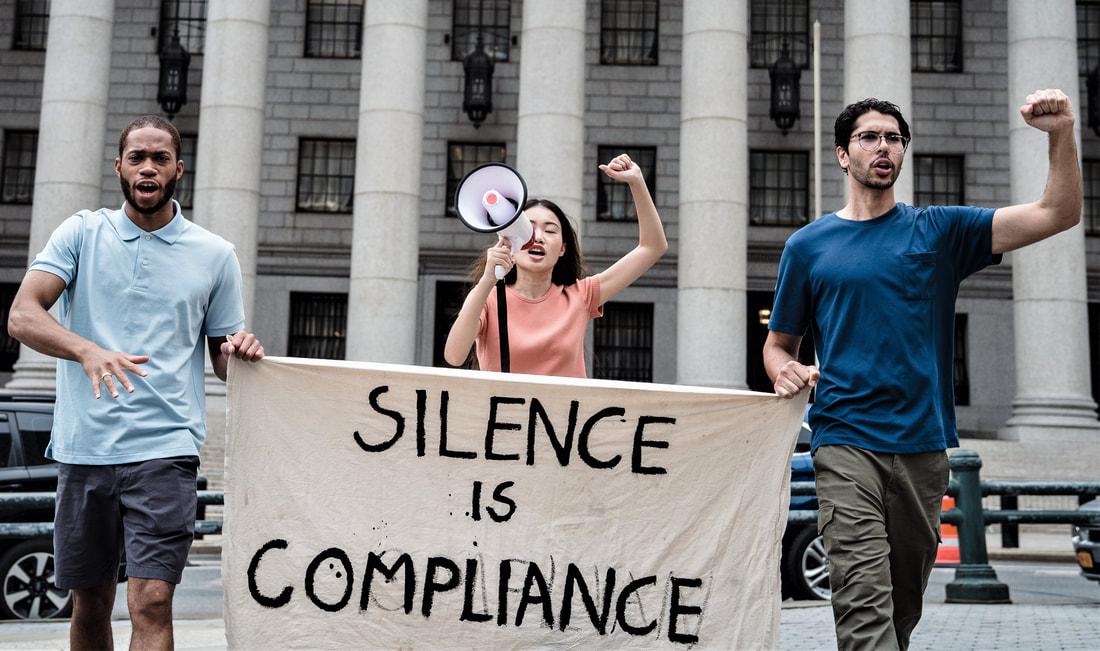|
‘When the world is silent, even one voice becomes powerful.’ (Malala Yousafzai) It’s about influencing, convincing, persuading – often with or on behalf of vulnerable people or groups who may lack the power, opportunity or safety to do it alone or for themselves. It always focuses on change, typically hoping to create a shift in strategy, policy or practice. My earliest attempts at advocacy were in my early teens, campaigning against brutal mistreatment of animals in Spanish bull-fighting. In my later teens, I moved into human rights work to campaign vociferously against horrific political abuses and atrocities in El Salvador. In retrospect, I do wonder if my energetic beating of the drum achieved anything. My approach was certainly driven by passion, confronting head-on what I saw as critically important ethical issues. I would argue my case forcefully, growing ever-more skilful at constructing a stance based on sound evidence and, I hoped, near water-tight rationale. I was galvanised in this conviction and activism by my new-found faith as a follower of Jesus, and by biblical injunctions to: ‘Speak up for those who cannot speak for themselves, for the rights of all who are destitute. Speak up and judge fairly; defend the rights of the poor and needy’; ‘Defend the weak and the fatherless; uphold the cause of the poor and oppressed.’ In later years, I became increasingly convinced by the need for a radical change in my approach. There are occasions on which direct polemic is needed, for instance: for sake of conscience, to take a clear and unambiguous public counter-stance on an issue, irrespective of whether it will win the day. In many cases, however, I’ve found that prayer, empathy and diplomacy are more effective and less likely to provoke a defensive response. Diplomacy doesn't mean compromise. It does, however, call for humble respect; to see and relate to the ‘other’ as human, with their own hopes, anxieties, interests, pressures and concerns. John M. Lannon proposes 4 main strands to this approach: ‘Show empathy; Acknowledge opposing views; Maintain a moderate tone; Use humour where appropriate.’ To show empathy is to identify with the others’ feelings and to express genuine interest in their best interest. To acknowledge opposing views is, before arguing your own case, to show respect for the other by acknowledging any merits in their position. To maintain a moderate tone is to resist overstating your case and stay away from emotionally-loaded words. To use gentle humour can ease the tension in a situation, depending on the nature of the relationship. Some of the most inspiring role models in my own advocacy work have been: Mahatma Gandhi, Martin Luther King, Mother Teresa, Bob Hunter, Archbishop Oscar Romero, Jasmin Philippines, Mike Gatehouse, Sister Isabel Montero, Andy Atkins, Rudi Weinzierl, Mike Wilson, Greta Thunberg, Malala Yousafzai and Ruth Cook. Their approaches have all broadly been characterised by what the founders of Greenpeace saw as as 5 core elements and stances in world-changing individuals and movements: ‘Plant a mind bomb; Put your body where your mouth is; Fear success; The revolution will not be organised; Let the power go.’
22 Comments
‘I raise up my voice – not so that I can shout, but so that those without a voice can be heard.’ (Malala Yousafzai) I once had a secret meeting with the political wing of a revolutionary group from Central America, in a dark basement flat in London. But my story doesn’t start there. This was my moment. As I flicked through the pages of a UK newspaper, an article leapt out at me about the brutal civil war in El Salvador. I don’t think I’d heard of El Salvador before yet it reminded me of accounts I had read of horrific atrocities committed by the Nazis in WW2. I couldn’t change that terrible history but I could do something now. I quickly did some research then set to work straight away, creating flyers and posters and circulating and sticking them up anywhere I could think of, hoping to raise awareness and to spur others into action too. I talked incessantly to family, friends and colleagues about what was happening in El Salvador. Most responded with a bemused look: ‘Why get so wound up about a situation on the opposite side of the world and over which we have no control anyway?’ That didn’t deter me. It was my time to speak. I heard of a demonstration for El Salvador in London so I went there with a friend, both wearing our anti-war combat jackets. On arrival, we were approached by the organisers and invited to carry a banner. To our surprise, they asked us to march at the very front, directly behind a row of children who were carrying a banner too. Some 20,000 people assembled behind us. We raised our voices in safety – while human rights activists in El Salvador were having their throats cut and their bodies dumped onto the streets. Driven increasingly by vicarious trauma, I joined the El Salvador Committee for Human Rights, a team of 3 activists based in a small room, armed only with a manual typewriter. I had the privilege of volunteering alongside a humble legend, Mike Gatehouse, who had previously been captured and held by the military in Chile during the violent coup that had overthrown its democratically-elected government. My role now was to hitch-hike around the UK, encouraging and resourcing local activist groups to amplify their voice. As I look back, I realise that I didn’t have sufficient personal resilience to handle the stress, and I came close to burnout. My efforts were driven more by pain, empathy and instinct than by strategy and I’ve learned, since, the critical value of supervision. Yet Greenpeace’s profound slogan expressed our motivations too: ‘The optimism of the action is better than the pessimism of the thought.’ There are situations in which we have to act, not because we have any guarantee of success, but because somebody has to speak. [See also: Revolution; Protest; Words; Smoke; Nika; I did try] ‘How can we make the snakes feel safe?’ The power of metaphor. Last week I worked with a group of trauma-informed practice experts. We were thinking about leading and influencing change in dynamically-complex relational systems such as teams and organisations. I shared the image of a snakes-and-ladders game board as a way both of depicting the realities of such change experiences and as a way of managing expectations. Whilst playing with possible meanings for the snakes, the ladders and the game as a whole, we explored how, at times, those people or groups we may view as passive, blocking or undermining vis a vis our own plans may be acting out of anxiety. I was reminded of Richard Young’s two key questions in the organisation development (OD) arena: ‘Where's the power and how is it exercised?’ ‘Where's the anxiety and how does it manifest itself?’ In my experience, we may discover anxiety in all dimensions of human systems. Take, for instance, the leader who is feeling pressured by multiple tasks and demands and worried that the well-meaning initiative you are proposing will be the straw that breaks the camel’s back. Or the team member who is worried that the change you are advocating will increase her responsibilities and leave her feeling inadequate, deskilled or exhausted. I worked with a new senior leader who, in our monthly meetings, would ask me lots of very detailed financial questions. I found it time-consuming and stressful because, although I felt confident in managing my budget, I wasn’t used to reporting at such micro levels. Over time, I began to wonder if I might inadvertently have started to represent a snake in his system…and he in mine. At our next meeting, I asked what he would need from me to give him sufficient trust and confidence in my financial management that I wouldn’t need to report like this in subsequent months. He said: ‘If you were to report using financial language.’ I discovered that, as a Finance Director by background and accountable for my area at Executive level, my limited use of financial language had evoked anxiety in him that I may not have a grip on my team’s finances. I spoke with Finance, expanded my lexicon, reported briefly using his language at the next meeting – and we never returned to micro detail again. The principle here was to approach the person and the issue in an open spirit of curiosity, explore respective needs, identify tangible solutions, and apply them to practice. We both transformed from snakes into ladders and our relationship grew from strength to strength. ‘How is that human systems seem so naturally to gravitate away from their humanness, so that we find ourselves constantly needing to pull them back again?’ (Jenny Cave-Jones) What a profound insight and question. How is that, in organisations, the human so often becomes alien? Images from the Terminator come to mind – an apocalyptic vision of machines that turn violently against the humans that created them. I was invited to meet with the leadership team of a non-governmental organisation (NGO) in East Africa that, in its earnest desire to ensure a positive impact in the lives of the poor, had built a bureaucratic infrastructure that, paradoxically, drained its life and resources away from the poor. The challenge and solution were to rediscover the human. I worked with a global NGO that determined to strengthen its accountability to its funders. It introduced sophisticated log frames and complex reporting mechanisms for its partners in the field, intended to ensure value for its supporters and tangible, measurable evidence of positive impact for people and communities. As an unintended consequence, field staff spent inordinate amounts of time away from their intended beneficiaries, completing forms to satisfy what felt, for them, like the insatiable demands of a machine. The challenge and solution were to rediscover the human. A high school in the UK invited me to help its leaders manage its new performance process which had run into difficulties. Its primary focus had been on policies, systems and forms – intended positively to ensure fairness and consistency – yet had left staff feeling alienated, frustrated and demoralised. We shifted the focus towards deeper spiritual-existential questions of hopes, values and agency then worked with groups to prioritise high quality and meaningful relationships and conversations over forms, meetings and procedures. The challenge and solution were to rediscover the human. Academics and managers at a university for the poor in South-East Asia had competing roles and priorities, and this had created significant tensions as well as affected adversely the learning experience of its students. The parties had attempted unsuccessfully to resolve these issues by political-structural means; jostling behind the scenes for positions of hierarchical influence and power. They invited me in and we conducted an appreciative inquiry together, focusing on shared hopes, deep values, fresh vision and a co-created future. The challenge and solution were to rediscover the human. Where have you seen or experienced a drift away from the human? Curious to discover how I can help? Get in touch! Diversity: a problem to be solved...or an opportunity to be grasped? What do you think? 'Whatever affects one directly, affects all indirectly.' (Martin Luther King) DEI, EDI, DIE..acronyms, used interchangeably with a similar meaning. It’s the stuff of diversity, equality/equity and inclusion. If the very sight of those words makes you yawn with boredom or roll your eyes with frustration, DEI experts and advocates need to ask why. To see a glowing example of passion, creativity and inspiration in this arena, have a glance at Shine! The challenges that EDI sets out to tackle are important, complex and human. They affect very real, vulnerable and disenfranchised people in organisations and the wider world. Most DEI policies and plans I see represent implicitly: (a) a legal rights-based approach; that is, to offer protection against illegal discrimination, and ensure equality of access to opportunities and resources; and (b) a humanistic values-based approach; that is, to treat everyone respectfully as human beings, and appreciate the differences between people. Both offer a critical baseline for healthy conduct and behaviour in liberal-democratic societies. We could think of these approaches as, essentially, ideologically-based. They flow from a vision of organisations and societies in which, in particular, people and groups that are non-dominant and less-privileged are offered special protection and support so that they, alongside others, can enjoy free and fulfilling lives. They recognise a genuine risk in any group or society that less-powerful people will be and become marginalised by the cultural interests and priorities of the privileged majority. Against this backdrop, EDI initiatives often prioritise, first and foremost, legal and policy requirements as core foundations. An underlying challenge for these types of ideological approaches is how to gain and sustain traction if others, especially those in powerful positions, don’t share the same vision and values, or a desire to prioritise them. An unintended consequence of effective recent social-political lobbies such as LGBTQ+, BLM and Extinction Rebellion has been to create a silent-silenced group that, for reasons of expediency, presents a convincing, socially-presentable façade, yet with no real substance behind it or commitment to change. Climate activist Greta Thunberg calls this out as the cynical ‘Blah, blah, blah’ phenomenon. For the DEI venture to exert greater transformational influence and impact, I believe those who promote it need to become better at evaluating and demonstrating the tangible benefits of diversity: especially to the pragmatist-sceptics. It’s not enough to create and enforce laws and policies, important as they are for protection, equality and inclusion. It’s not enough to appeal for kinder, fairer and more tolerant organisations – although, as a follower of Jesus – I see such qualities as having intrinsic value. EDI's core proposition that 'diversity is a good thing' will prove far more persuasive if it can show convincingly why. I may have something useful to offer here. For many years, I have had the privilege of working internationally with leaders and professionals from diverse cultures and backgrounds. I often use a powerful, small-group, peer-coaching method called ‘Action Learning’. It enables people who face wicked problems to make better decisions, faster. Diversity in such a group is a critical success factor because it enables a person to unpack an issue, stress-test her or his assumptions and create innovative solutions – precisely because peers pose stretching questions from vastly different perspectives and experience-bases. One organisation I worked with had a strong commitment to DEI. It employed people from a wide range of countries and backgrounds and worked hard to ensure that everyone was treated in the same way. Ironically, its efforts had inadvertently blinded it to the value of difference. It missed completely the significant potential that such diversity can offer when running projects, dealing with challenging issues etc. I invited the leaders to engage in a simple experiment – to create problem-solving and innovation teams based on radical diversity as the key team criterion, irrespective of formal role. The results were truly astonishing. As EDI progresses, develops and learns, I believe that this kind of testing, evidencing and presenting of practical benefits, alongside issuing or enforcing an ethical call, will prove vital and fruitful. It will be an invaluable area for further research. I work with asylum-seekers and refugees who often feel depressed and frustrated by being characterised as helpless victims, rather than as resourceful contributors who want to show they can make a difference. Legal rights-based and humanitarian values-based approaches to DEI are a critical bedrock. A benefits-outcomes approach could ensure an additional life-giving dimension. |
Nick WrightI'm a psychological coach, trainer and OD consultant. Curious to discover how can I help you? Get in touch! Like what you read? Simply enter your email address below to receive regular blog updates!
|








 RSS Feed
RSS Feed